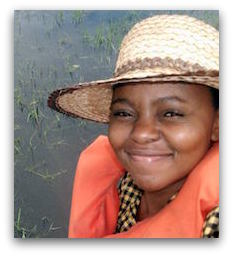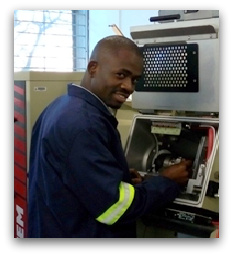Young Scientists to Represent RISE at Dakar Meetings
Four of the current RISE fellows will represent the project at the upcoming Next Einstein Forum Global Gathering, to be held in Dakar, Senegal on March 8–10. They have also been invited to participate in the pre-Forum (March 6–7) workshop sponsored by the U.S. National Science Foundation Office of International Science and Engineering: "Innovations at the Nexus of Food, Energy and Water Systems (INFEWS)."
Three of these fellows were selected as Next Einstein Forum Ambassadors: Bame Sanah Keabetswe will represent Botswana; Masixolise Pelly Malebe, South Africa; and Aneth David, Tanzania. Michael Oluwatosin Bodunrin was selected as a runner-up for Nigerian Ambassador, and SIG will sponsor his attendance at the 2016 NEF Global Gathering.
Bame Sanah Keabetswe is a SSAWRN MPhil candidate at the University of Botswana's Okavango Research Institute (ORI). She is studying heavy metal chemistry in the Okavango Delta and also works as a research assistant. She hopes to continue on to do a PhD in chemistry after she completes her MPhil. Bame is involved in volunteering in her community, and is an active member of Femina Woman Association, a Motswana non-governmental organization that promotes women's empowerment and mentorship activities.
Pelly Malebe is a SABINA PhD candidate in biotechnology at the University of Pretoria in her native South Africa. Her current research focuses on identifying and developing genetic markers for drought tolerance and yield in the tea plant. Pelly's focus is on increasing the understanding of the genetic basis of drought tolerance in plants, which may lead to drought-tolerant crop varieties and improved food and job security. She has received several awards including the South African Department of Science and Technology Women in Science Award Doctoral Fellowship. She is currently employed as a sales specialist for molecular and cell biology research solutions.
Aneth David is a SABINA MSc candidate in biotechnology at the University of Dar es Salaam, Tanzania, where she also received her BSc. Her MSc research has focused on the effectiveness of soil bacteria in improving food production and lengthening the shelf life of crop harvests. Her research has inspired her to probe deeper into the impact of scientific research on the daily lives of Tanzanians, and she is currently conducting a survey on the topic. She is a member of the Youth of United Nations Association of Tanzania (YUNA Tanzania), the African Society for Bioinformatics and Computational Biology (ASBCB), and H3ABioNet. She aspires to a scientific research and academic career in which she can explore, share, and impart knowledge and experiences and work closely with the younger generation.
Michael Oluwatosin Bodunrin is an AMSEN PhD candidate at the University of the Witwaterstrand. He is also a member of the academic staff in the Department of Metallurgical and Materials Engineering at the Federal University of Technology in Akure, Nigeria. His doctoral research focuses on the development of low-cost titanium alloys for land-based applications using novel titanium powders and inexpensive alloying elements. Bearing in mind the relevance of light alloys for energy conservation and environmental sustainability, one of the objectives of Michael's research is to develop models for optimizing hot working of titanium alloys. This entails simulating industrial forming processes under laboratory conditions using the Gleeble 3500 thermomechanical simulator (pictured above). Michael believes that increased pan-African research collaboration will pave the way for African scientific independence, and he hopes to incorporate advocacy work into his future academic career.
The INFEWS workshop will bring together a small group of experts from Africa and the U.S. to write a white paper that will serve as a scientific foundation for research toward sustainable policies and strategies to manage ecosystems for food, energy, and water availability. The white paper will be delivered and discussed at the NEF.
The Next Einstein Forum (NEF) is a platform that brings together leading thinkers in science, policy, industry and civil society in Africa to leverage science to solve global challenges. An initiative of the African Institute for Mathematical Sciences (AIMS) and the Robert Bosch Stiftung, the NEF mobilizes the brightest minds to address the most pressing problems through science, technology, engineering and mathematics (STEM), as well as the social sciences. The first NEF Global Gathering will be hosted by H.E. President Macky Sall in Dakar, Senegal on March 8–10, 2016. The three-day NEF Global Gathering will showcase often underreported scientific progress in Africa, holding up the NEF Fellows as examples of the exceptional scientific potential and progress across Africa.
The text in this section has been adapted from the official INFEWS workshop invitation and the Next Einstein Forum website.



.jpg)

.png_pagespeed_ic_F3J9Nok1Eh.png)
.png)
